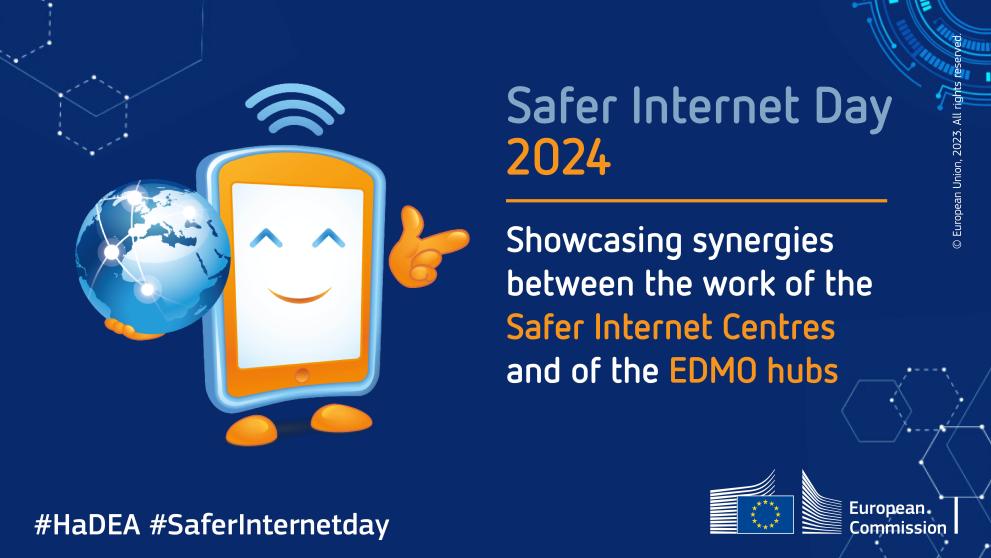
Safer Internet Day (SID) aims to raise awareness of online safety issues, including disinformation and fake news and their impact on our society. Media and digital literacy skills are paramount to users to understand how content is produced and shared, and just as important to identify trustworthy sources.
The Safer Internet Centres (SICs), co-funded under the Digital Europe Programme aim to raise awareness of online issues, inform, advise and assist children, parents, teachers and carers about online safety and how to fight against illegal content online.
The European Digital Media Observatory (EDMO) hubs, co-funded under the Connecting Europe Facility and the Digital Europe Programme, aim to combat disinformation by understanding and analysing disinformation.
Below are some useful resources related to disinformation and fake news developed by the SICs and by the EDMO hubs:
- EU: The CEDMO hub developed an interactive game (available in English) called "Factology Checker" that aims to educate the players on disinformation and to familiarise them with the role of artificial intelligence in tackling disinformation while gathering data valuable for further research and development of AI-based tools to support the work of fact-checkers. The hub also created a Polish guide titled “How to deal with disinformation.” that contains practical advice on how to avoid being influenced by disinformation messages, and video campaigns and video podcasts (available in Polish) targeting the general public.
- Austria: The Safer Internet Centre in Austria developed a scavenger hunt on fake news (available in German) that challenges players to independently research the answers to questions related to fake news.
- BENELUX: The EDMO BELUX organised a media literacy campaign (available in English, French, Dutch and Luxembourgish) with tips on how to address doubts with content online. The hub also created a repository of educational tools (available in French and Dutch) that brings together tools available that can help teachers and other educators to make young people and adults resilient against disinformation.
- France: The DE FACTO hub created an educational video to showcase how families can do fact-checking. In addition, the hub developed a fact-checking game for ages 12+ to explore the steps of establishing the trustworthiness of information.
- Greece: The Safer Internet Centre in Greece developed a lesson plan on disinformation (available in Greek), encouraging young children to start to think about online content and helping them to understand that what they read or see online might be true, untrue, or someone’s opinion. In addition, they created a lesson plan on disinformation (available in Greek) intended for adolescents to critically think about online content. The SIC also created a video (available in English and in Greek) that explains how to spot disinformation with simple words.
- Romania: The Safer Internet Centre in Romania created a webinar (available in Romanian) that aims to support parents to recognise fake or misleading content in the online environment.
Background information
The Digital Europe Programme (DIGITAL) builds on and continues to support the work of SICs which has already been carried out under the Connecting Europe Facility - Telecom between 2015 and 2021. DIGITAL aims to build the strategic digital capacities of the EU and to facilitate the wide deployment of digital technologies. With an overall budget of €7.5 billion, out of which €0.8 billion is managed by HaDEA, the programme supports investments in the following sectors:
- High Performance Computing
- Cloud, data and Artificial Intelligence
- Cybersecurity
- Advanced digital skills
- Accelerating best use of technologies
HaDEA manages actions under Cloud, data and Artificial Intelligence, Advanced Digital Skills and Accelerating best use of technologies.
The European Commission Communication 'Tackling online disinformation: a European Approach' provides more information on the role that media literacy may play to effectively address the challenges posed by disinformation.
More on Safer Internet Day 2024
Safer Internet Day 2024 – Together for a better internet - European Commission (europa.eu)
Details
- Publication date
- 20 February 2024
- Author
- European Health and Digital Executive Agency
- Programme Sector
- Digital
- Programme
- Connecting Europe Facility 2
- Digital Europe Programme
- Tags
- Cybersecurity
- EUFunded
- Event
